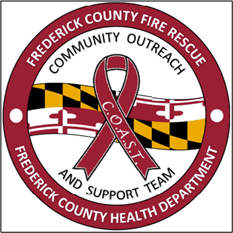They total almost $2-million.

Frederick, Md (KM) Frederick County is the recipient of two grants which will be used to help combat the opioid epidemic. One totaling $1.8-million comes from the Substance Abuse and Mental Health Services Administration, and will be spread out over four years, The second one in the amount of $150,000 comes from the Foundation for Opioid Response and will last two years.
“I think what it’s going to do is going to make our model an example that I hope other jurisdictions across Maryland will be able to copy and implement,” says Frederick County Paramedic Matt Burgan.
He says the grants will expand the cooperation between the Division of Fire and Rescue Services and the Frederick County Health Department to operate the Community Outreach and Support Team (COAST).
Part of the SAMSHA Grant will be used to hire medical professionals such as registered nurse practitioners or physician’s assistants to accompany EMT’s on overdose or substance misuse calls. Burgan says these people could help the individual with substance use disorder with primary health care needs. “But then also we would look for the practitioner to be able to provide some supportive services with medications for opioid abuse disorder such as buprenorphine,” he says. “So we’re very excited to be able to have a practitioner on staff that can do some more definitive treatment.”
.
Burgan also says the SAMSHA grant will also pay for outreach efforts, particularly to the medical community. “And giving those practices an avenue that they refer patients to if they’re treating somebody that maybe hasn’t encountered EMS before, and having a pathway where they can connect to a peer and to a paramedic with the hope of maybe even preventing the next 911 call,” he says.
The $150,000 grant from the Foundation for Opioid Response (FORE) will help expand the number of peer recovery specialists. Burgan says these individuals are those who have gone through substance abuse, and have recovered. He says these peer specialists can help those currently suffering from substance misuse find treatment. “That is a huge benefit that cannot be overstated. Getting to work with somebody that has a lived experience with addiction, and can relate with what the patient’s going through,” says Burgan.
Currently, this service is available 40 hours a week. Burgan says this grant will expand that service to 20 hours a day, seven days a week.
The FORE grant will also provide additional training for EMT’s who respond to overdose calls. “All of our field personnel will be privileged to a four-hour course on identifying opioid emergencies , responding to them, and supporting people as they journey on their path to recovery,” says Burgan.
The purpose of these programs, he says, is to help those who are addicted and is to reduce the number of 911 calls for overdoses. “We make a business out of responding to calls for service, but the truth is we’d rather not,” says Burgan. . “We don’t want that emergency to happen, and if we can prevent it, it’s a just better system of care all around.”
By Kevin McManus